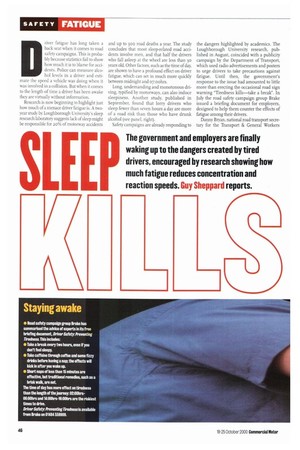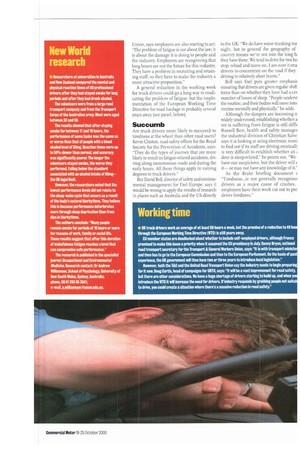river fatigue has long taken a back seat when it
Page 48

Page 49

If you've noticed an error in this article please click here to report it so we can fix it.
comes to road safety campaigns. This is probably because statistics fail to show how much it is to blame for accidents. Police can measure alcohol levels in a driver and estimate the speed a vehicle was doing when it was involved in a collision. But when it comes to the length of time a driver has been awake they are virtually without information.
Research is now beginning to highlight just how much of a menace driver fatigue is. A twoyear study by Loughborough University's sleep research laboratory suggests lack of sleep might be responsible for zo% of motorway accidents and up to 300 road deaths a year. The study concludes that most sleep-related road accidents involve men, and that half the drivers who fall asleep at the wheel are less than 30 years old. Other factors, such as the time of day, are shown to have a profound effect on driver fatigue. which can set in much more quickly between midnight and oToohrs.
Long, undemanding and monotonous driving, typified by motorways, can also induce sleepiness. Another study, published in September, found that lorry drivers who sleep fewer than seven hours a day are more of a road risk than those who have drunk alcohol (see panel, right).
Safety campaigns are already responding to the dangers highlighted by academics. The Loughborough University research, published in August, coincided with a publicity campaign by the Department of Transport, which used radio advertisements and posters to urge drivers to take precautions against fatigue. Until then, the government's response to the issue had amounted to little more than erecting the occasional road sign warning "Tiredness kills—take a break". In July the road safety campaign group Brake issued a briefing document for employers, designed to help them counter the effects of fatigue among their drivers.
Danny Bryan, national road transport secretary for the Transport & General Workers Union, says employers are also starting to act: "The problem of fatigue is not about the law; it is about the damage it is doing to people and the industry. Employers are recognising that long hours are not the future for this industry. They have a problem in recruiting and retaining staff, so they have to make the industry a more attractive proposition."
A general reduction in the working week for truck drivers could go a long way to eradicating the problem of fatigue. but the implementation of the European Working Time Directive for road haulage is probably several years away (see panel, below).
Succumb
Are truck drivers more likely to succumb to tiredness at the wheel than other road users? Kevin Clinton, road safety officer for the Royal Society for the Prevention of Accidents, says: "They do the types of journey that are more likely to result in fatigue-related accidents, driving along monotonous roads and during the early hours. All these things apply in varying degrees to truck drivers."
But David Bell, director ofsafety and environmental management for F.xel Europe, says it would be wrong to apply the results of research in places such as Australia and the US directly to the UK: "We do have some trunking rur night, but in general the geography of country means we're not into the long h they have there. We tend to drive for two ho stop, reload and move on. I am sure it ena drivers to concentrate on the road if they driving in relatively short bursts."
Bell says Exel puts greater emphasis ensuring that drivers are given regular shift terns than on whether they have had a cer number of hours of sleep. "People undersi the routine, and their bodies will move into routine mentally and physically," he adds.
Although the dangers are becoming it widely understood, establishing whether a ver is suffering from fatigue is still diffii Russell Best, health and safety manager the industrial division of Christian Salve says it is looking at using electronic morn to find out if its staff are driving erratic* is very difficult to establish whether an dent is sleep-related," he points out. "We have our suspicions, but the driver will c it— or may not have any knowledge of it.'
As the Brake briefing document 5 "Tiredness.. .is not generally recognisei drivers as a major cause of crashes, employers have their work cut out to pre driver tiredness."












































































































